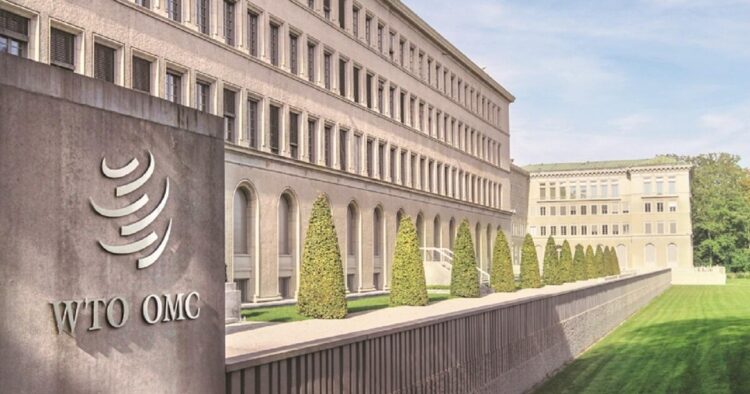KEY POINTS
- India opposes outdated WTO rules that restrict food subsidies and harm farmers.
- India defends its right to affordable medicines and challenges rigid patent laws.
- India demands fair digital trade policies to protect its economy and data sovereignty.
India is not blocking progress at the World Trade Organization (WTO). It is asking the right questions. And soon, many other developing countries might do the same.
India’s Rising Role in Global Trade. India is no longer a small player in the global economy. With a population of over 140 crore and a growing economy, India has become one of the largest exporters of medicines and agricultural products. But despite this rise, the rules of global trade, especially those made at the WTO, still treat India like a minor participant.
At the 12th Ministerial Conference (MC12) held in Geneva in 2022, India made it clear that it would not agree to global deals unless its concerns were addressed. These included issues like fisheries subsidies, food security, and access to life-saving medicines. India’s message was simple: our national interests cannot be sacrificed to keep outdated trade rules alive.
The Problem with Food Subsidy Rules
Farming is not just an occupation in India, it is a way of life. Around 55% of the Indian population is involved in agriculture. India provides food at low prices to nearly 80 crore people through its Public Distribution System (PDS). To do this, the government buys rice and wheat at Minimum Support Prices (MSP) that are often higher than market prices.
But WTO rules limit how much a country can spend on such subsidies. The so-called Amber Box rule caps subsidies at 10% of the value of agricultural production (based on 1986-88 prices). This limit was set in the 1990s, when India had little role in world trade. Now, India is the second-largest producer of rice and wheat, and this old rule has become a big hurdle.
For example, in 2020-21, India’s rice subsidies were estimated to be 52% above the allowed limit. Some U.S.-based studies even claim India’s rice support reached 87% of production value, almost nine times the WTO cap.
To avoid penalties, India has used a “peace clause” created in 2013, which temporarily protects such subsidies. But India wants a permanent solution, either an update of the outdated base prices or a full exemption for food security programs. Until then, India says it will continue using subsidies to feed its people.
Intellectual Property and Public Health: The COVID-19 Example
India’s pharmaceutical sector is one of the most important in the world. It supplies 60% of global vaccines and over 20% of generic medicines. But strict patent laws under the TRIPS Agreement (Trade-Related Aspects of Intellectual Property Rights) can make life-saving drugs unaffordable in developing countries.
In 2020, during the COVID-19 pandemic, India and South Africa proposed a temporary waiver of patent rights for COVID-related vaccines and treatments. The goal was to allow poor countries to make their own affordable versions. But rich nations resisted the proposal for almost two years. By the time a limited waiver was approved in 2022, it was too late to make a real difference.
This delay proved India’s point: in times of global crisis, the system still favors rich countries. India has repeatedly stated that its patent laws — including rules to block “evergreening” of patents and allow compulsory licensing- are within WTO rules. Yet pressure from the West continues.
Digital trade is another area where India is taking a bold stand. Since 1998, WTO members have agreed not to charge customs duties on digital goods like music, e-books, or software. But now, India and other developing nations argue that this benefits large tech companies while hurting the tax revenues of poorer nations.
At the WTO MC13 conference in Abu Dhabi in 2024, India refused to extend the moratorium on digital duties unless it could keep its digital services tax and data localisation policies. Indian officials rightly point out that many items once traded physically, like films and games, now move digitally and should not escape taxation.
A UNCTAD report in 2019 said developing countries lose around $10 billion every year because of this ban. India believes that without a global tax solution or compensation, continuing this ban is unfair.
Who Wrote These Rules, and Why Do They Still Apply?
Many of the WTO’s trade rules were written in 1995, when India’s share in global trade was low. But the world has changed. Countries like India, Indonesia, Brazil, and South Africa are now major players. Yet the rules still favor the United States and the European Union, who originally shaped the system.
For instance, developed countries want India to give up its “developing country” status, which gives it special rights and more time to implement rules. But India argues that huge poverty still exists, and the gap between rich and poor countries is still wide. India also speaks for the Global South, a term for developing nations across Asia, Africa, and Latin America.
When powerful nations push for changes that hurt the poor, India resists. It believes the WTO must support inclusive growth and fair development, not just protect the interests of the rich.
India’s actions at the WTO are not about blocking global trade. They are about reforming an outdated system that no longer reflects today’s global realities. As more countries grow into middle-income economies, they too will demand changes.

















Comments